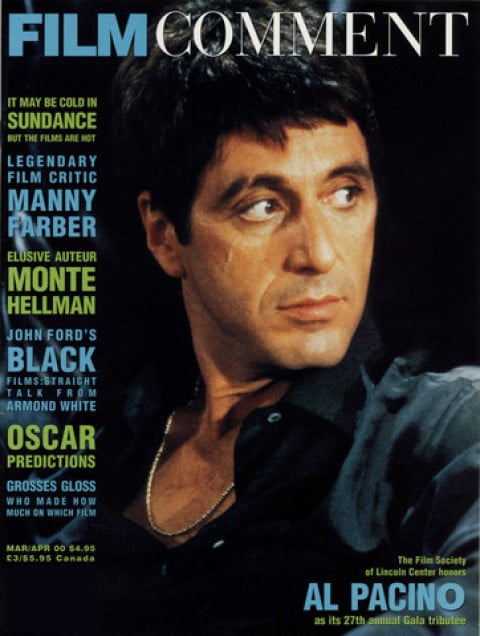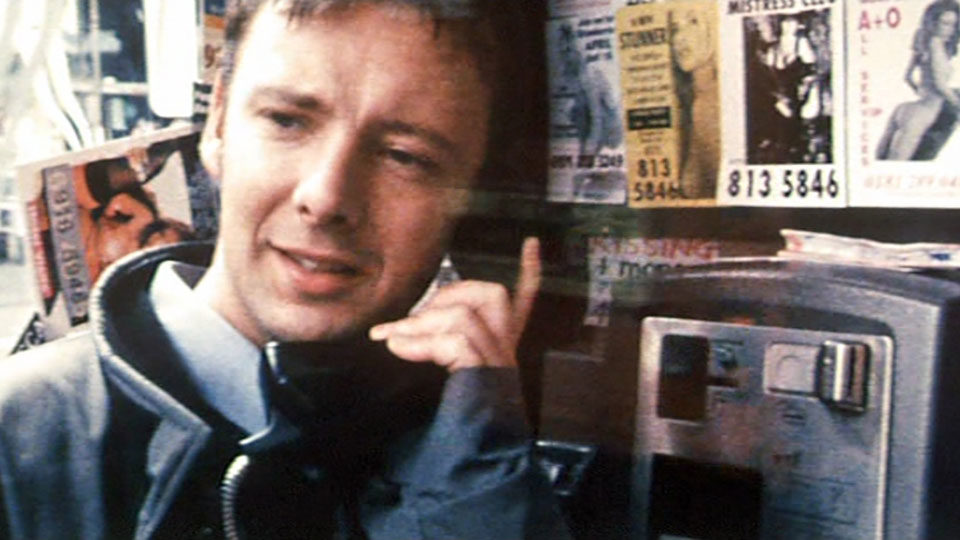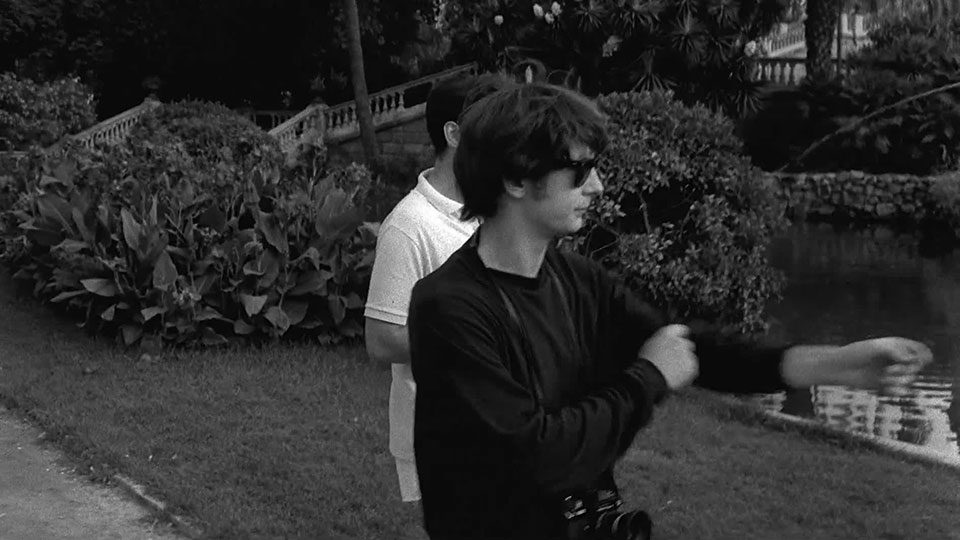By Mark Olsen in the March-April 2000 Issue
Ian Hart
Presence, Versatility, Achievement
You know him. Though the name may be familiar and the face vaguely recognizable, they don’t mesh together as a celebrity brand name. Across roles in more than two dozen films, in the U.S., Ireland, and his native England, he has carved out a series of versatile performances that are never flashy but always intriguing. A true character actor, in the sense that he breathes dynamic life into the smallest of roles as well as leading parts, he is never less than eminently watchable. His name is Ian Hart.

From the March-April 2000 Issue
Also in this issue
“I’ve predominately become, for whatever reason, a character actor. That’s when I get the call,” conceded Hart during a recent visit to New York. “They’ve usually cast the leading man by the time they call me. And that is a bit of a backhanded compliment, if you want to perceive it that way. But I just try to achieve what I can on any particular film. I try different things, but I try to do them all from the same basic standpoint of being real.”
His performances in two current releases, Aileen Ritchie’s The Closer You Get and Michael Winterbottom’s Wonderland, neatly showcase what makes him such a rare and remarkable talent. Both films are ensemble pieces and his parts sound similar—characters who are hard-headed and selfish, drink too much—yet Hart invests each with individuality, so that the generic similarities are noticeable only in hindsight. His role in The Closer You Get surveys a small-town Irish shopkeeper (“Kieran O’Donnell—Master Butcher,” as his sign declares) who all too sharply feels the tug to find a wife, settle down, and leave his sagging, boyish bachelorhood behind. The film is a charming wisp of work, an appropriately cute romantic comedy that acutely navigates the thin line between sweet and icky. Hart, as always, builds his character through the accumulation of small details, such as when, having had a drink dumped on him by a prospective paramour, he fishes the lemon from his hair and casually sucks on it to wash down the bitter aftertaste of defeat.

Wonderland is a much different film, free-falling its way through the densely interconnected lives of a group of Londoners. Hart plays a divorced dad, the type who, during a visit with his son, leaves the boy alone at home to go ‘round the pub. Barely more than a child himself, he is incapable of accepting even the barest of responsibilities. The character, though thoroughly unlikable, evinces just enough confusion and uncertainty that one feels a genuine sympathy for his impenetrable density, the ways in which he will never understand himself. Hart takes a role that could easily veer into loutish cartoon and sets its heart to beating.
Hart’s first feature film role, while still a teenager, was in Peter Smith’s No Surrender (85), in a part billed in the end credits as “uncertain mugger.” There is a certain aptness to that, since a trademark of Hart’s work is his earnest sensitivity toward those things that make someone weak or unpleasant, yet ultimately make a character seem human and real. “In films,” Hart elaborates, “there seems to be a desire to put forward things that are perfect, that are not flawed. And yet most people I know are a mess. So these flaws happen to end up in a lot of the characters I play, in that they are, we are, fundamentally flawed.”
Hart first came to the attention of many filmgoers with the one-two punch of playing the young John Lennon in Christopher Münch’s The Hours and Times (91) and Iain Softley’s Backbeat (93). It bespeaks the intensity with which Hart prepares for and attacks each role that the two parts are each distinctive in their own right: in Hours he surveyed Lennon during the earliest flowerings of his fame in 1963, then worked back to the ambitious young rock-and-roller of 1960 for Backbeat. “I had to grow him backwards, yeah. I think The Hours and Times is far more what you’d expect from watching A Hard Day’s Night, reading the books. Backbeat was more about trying to figure out what it was like to be in a band when you were 17. I remember years ago I was in a band, with the egos and personalities. I got more information out of that than from any book.”

The two roles branded him as Lennon in the popular imagination to such an extent that it became difficult to get other parts. “I’ve been chasing it ever since, in a way,” remarks Hart. “I’d been given an opportunity which just as easily could have killed me. A year after I made Backbeat I still wasn’t working. And I could still not be working now, had it not been for Ken Loach casting me in Land and Freedom [95].” Since then Hart has worked steadily. His role in Thaddeus O’Sullivan’s Nothing Personal (95; he had originally been offered the lead, but preferred a supporting character) won him an acting prize at the Venice Film Festival. Hart also notably appeared in Jez Butterworth’s adaptation of his own stage play Mojo (97). Never properly distributed in either the U.S. or Britain, it is worth seeking out, an intensely harrowing (if seemingly unlikely) Absolute Beginners-meets-Reservoir Dogs that also features a memorable turn from playwright Harold Pinter. Hart even inexplicably turns up in a blink-and-you’ll-miss-him role as an NSA heavy in Tony Scott’s Enemy of the State (98). “I’m still fascinated by it,” recalls Hart. “I wanted to ask, where does he come from, what does he want out of life? And the fella gets out of a car with a gun. But I achieved what little I set out to achieve, which was to blend in, and just appear to be a regular American actor.”
Perhaps Hart’s finest work to date, and a role of which he is obviously (and rightfully) quite proud, is as the private detective Parkis in Neil Jordan’s The End of the Affair (99). Hired to, in essence, investigate the man who has hired him, Parkis comes to form the structural heart of the film, as the sincerity, humility, and basic humanity with which Hart infuses the role bleeds out into the story as a whole. And his final-reel revelation cements the film’s own sense of spiritual inquiry and wonder. “I was really happy to get it, because for me it’s quite a big role, and yet it is only five scenes. And you have a choice there, you could just get up and say it, because it’s not about you, it’s about Ralph [Fiennes] or Julianne [Moore]. But you invest the character with as much as you can, so that hopefully it stands up by itself. If it’s a real person, if at the end of the film people feel like they’ve seen somebody and believed them, they go home and think, I remember him from that film even though he was only in it for ten minutes. In The End of the Affair people remember my role because structurally he’s there for a reason, but also because the character seems complete.”
While it’s a shame that Hart may never achieve the level of recognition his ever-evolving and improving body of work deserves, it would be just as unfortunate to be robbed of the prickly thrill of having him arrive onscreen unexpected. His mere presence raises the bar of every film he is in—and he is, perhaps above all else, a presence, bringing a weight and materiality to his moments onscreen—across the wide expanse of roles he has brought so convincingly to life. And if, in his words, “the whole point of doing it in the first place is trying to get better,” one can only imagine where he may in fact end up.







